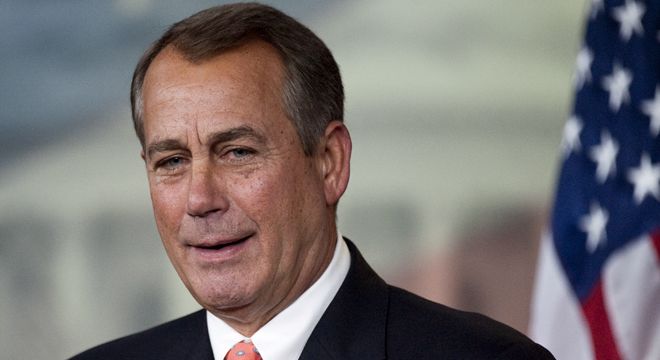Democrats won the election, handily, on a platform of raising income tax rates on wealthy Americans.
Now, thanks to the expiring Bush tax cuts, they have all the leverage they need to lock those higher tax rates in permanently.
And yet they’ve been drawn into a spat with Republicans over which party should put forward ideas for cutting Medicare spending as a down payment on further deficit reduction in 2013.
Why are Dems even bothering to entertain the idea that Medicare cuts right now are necessary?
Allow me to reintroduce you to the debt ceiling.
“As I told the president a couple weeks ago, there’s a lot things I’ve wanted in my life but almost all of them had a price tag attached to them,” House Speaker John Boehner (R-OH) told reporters at his weekly Capitol briefing Thursday. “And if we’re going to talk about the debt limit in this, then there’s going to be a price tag associated with it.”
By the end of the year, the country will once again hit its borrowing limit. Within several weeks, it will have to lift the debt ceiling, and Boehner is once again refusing to do so unless new borrowing authority is accompanied by concomitant budget cuts.
“I continue to believe that any increase in the debt limit has to be accompanied by spending reductions that meet or exceed it,” Boehner added.
The White House’s official position is that Boehner can take this rule and shove it: the administration is actually proposing stripping from Congress the power to set a debt limit altogether. But that’s a non-starter and President Obama privately, and Democratic leaders publicly, are tacitly ceding Boehner this leverage by insisting that Congress raise the debt limit as part of a package of revenue increases and spending cuts they hope to pass before the new year.
The debt limit hike isn’t actually a variable in the budget math concentrating Democratic and Republican minds ahead of 2013. But when Congress raises it and in what context has huge implications for the ultimate shape of the tax and safety net reforms the parties settle upon.
Ignore the need to raise the debt ceiling for now, and Democrats have all of the near-term leverage. If Republicans don’t agree to increase tax rates on wealthy people, everyone’s taxes will increase significantly automatically, and they’ll have to cut middle-income taxes — but not upper-income taxes — retroactively.
But, as Senate Majority Harry Reid (D-NV) and others have noted, that means Republicans could turn right around and demand huge concessions from Democrats in exchange for raising the debt ceiling. If that happens, the White House has indicated it will call Boehner’s bluff. Force him to raise the debt limit cleanly, or tank the U.S. and global economies. But if they lacked the nerve, Boehner could walk away with another huge pot of concessions from Democrats.
That’s why Reid and company want to raise the debt limit now, as part of a near-term budget deal, and avoid that brinksmanship. But that means they don’t control all the leverage. And it’s why Republican demands for Medicare cuts are getting a hearing.






